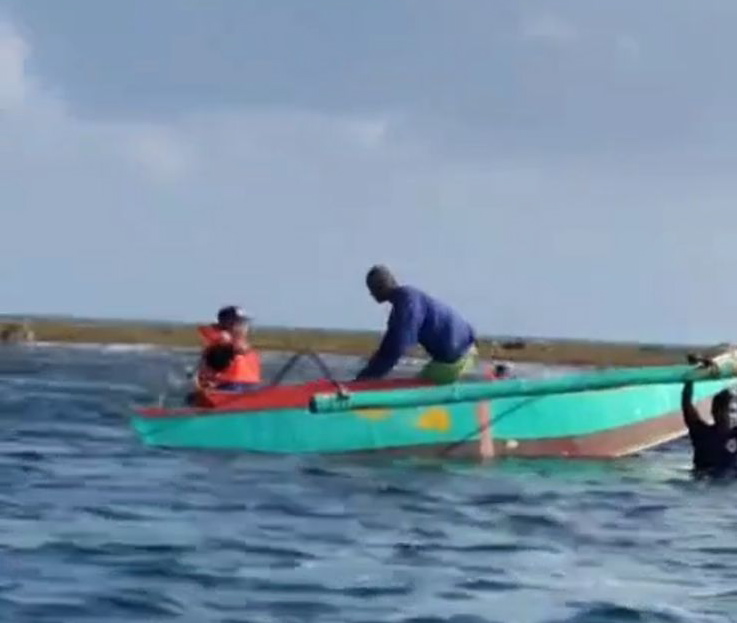
The Chinese Coast Guard tried to drive away Filipino fishermen in Bajo de Masinloc in the West Philippine Sea.
SCREENGRAB/FILE
MASINLOC—Zambales provincial officials offered little relief to fishermen crying for help in enforcing the 2016 arbitral ruling against China’s sweeping claims to the South China Sea during a joint hearing held by the House committee on national defense and security, and the special committee on the West Philippine Sea here on Friday.
Gov. Hermogenes Ebdane Jr., a former national police chief and national security adviser, said that if the arbitration case against China was one-sided, “We can’t really enforce it.”
“That’s what people should understand. Filipinos must know that in the arbitral ruling, if a group doesn’t want to follow, we can’t force it,” Ebdane said during the dialogue with fishermen displaced by the China Coast Guard (CCG) and its maritime militia from Panatag (Scarborough) Shoal, also called Bajo de Masinloc.
China refused to participate in The Hague arbitration case and rejected the arbitral award.
The arbitral tribunal invalidated China’s historical claims as without legal basis and upheld the Philippines’ sovereign rights to its exclusive economic zone (EEZ), including the waters of the West Philippine Sea.
Mayor’s steps
Masinloc Mayor Arsenia Lim said she recognized the longstanding maritime tensions between China and the Philippines in the WPS.
“I heard many complaints from the fishermen who continue to venture there (at Panatag),” Lim said.
The mayor said she had been “empowering all cooperatives,” including those of local fishermen, to help them in their livelihoods despite being displaced by the escalating tension in the WPS.
But Leonardo Cuaresma, president of the New Masinloc Fishermen Association, refuted Lim’s claims.
“It is not true that she supported all the fishermen because when she first served as our mayor, instead of supporting the current organizations, she created another organization, and that is all she is helping,” Cuaresma told the Inquirer.
According to him, only the members of the cooperative that Lim formed are the ones receiving aid from the local government.
Joey Marabe, provincial coordinator of fisherfolk group Pamalakaya, said that it was necessary to investigate the “gentleman’s agreement” between former President Rodrigo Duterte and China.
“It can be recalled that Duterte entered into a verbal fishing agreement with China. The said agreement emboldened China to intensify its large-scale poaching operations in our territorial waters, at the expense of the Filipino fisherfolk,” Marabe said.
Old fears stoked
He added that the investigation should focus on the adverse effects of the agreement on Filipino fishermen, not just political rivalry.
Jeoffrey Elad said generations of Filipino fishermen had been stewards of Panatag and had endured Chinese harassment.” What we want is to be able to freely fish in the area,” he said.
“Reports that China will start arresting those who encroach on these areas honestly break our heart,” Elad added, referring to a new Beijing policy empowering its coast guard to arrest and detain those who illegally cross its borders starting on June 15. “All we want is for the situation there to be stable and for us to not feel scared every time we go out to sea.”
Zambales Rep. Jefferson Khonghun said the hearing stemmed from a resolution by 1-Rider Rep. Rodge Gutierrez seeking an inquiry into how the pact between Duterte and China’s President Xi Jinping on Ayungin (Second Thomas) Shoal south of Panatag has affected the country’s fisherfolk who depend on the West Philippine Sea for a living.
At a forum in the University of the Philippines College of Law also on Friday, fishermen from Zambales and Pangasinan, said they had to deal not only with a diminishing income but also with “psychological trauma” due to China’s persistent harassment in their traditional fishing ground.
One of them, Randy Megu, 51, from Infanta town in Pangasinan, said he and his team members used to catch two to three tons of fish in just three days of fishing at Panatag. Each team member would earn P5,000 to P6,000 then.
But due to the Chinese access restrictions and with Chinese vessels driving them away from the shoal, they now have to spend more time to catch the same amount of fish.
“Before, we only needed to spend three days to have a good catch, but now we need to spend at least half a month,” Megu said during the “Voices from the Sea” forum at UP Diliman.
From their usual P6,000 income per fishing trip, they now go home with only P3,000 or sometimes zero.
China seized control of Panatag, which is about 246 kilometers west of Zambales province, in 2012 after a standoff between Chinese vessels and the Philippine Navy.
The July 2016 arbitral ruling declared Panatag, which is well-within Manila’s 370-kilometer EEZ, a common fishing ground for Filipinos, Vietnamese and Chinese.
Henrelito Empoc, spokesperson for Bigkis ng Mangingisda Federation, echoed Megu’s sentiments.
“We small fishermen and our family continue to starve and sink into poverty because of the harassment of the Chinese,” he added.
Megu told the Inquirer he last went fishing at Panatag in 2020. For now, they fish in the open sea.
He appealed to President Marcos to continue to assert their right and freedom to again fish freely at Panatag. —WITH A REPORT FROM NESTOR CORRALES